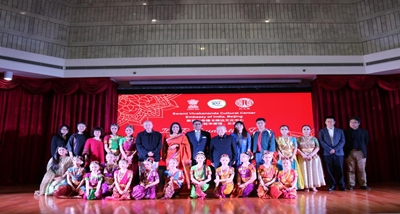
launch of the Little Guru app launched. From newsonair.com
Helping to launch a new Sanskrit-learning app called Little Guru to celebrate the 71st Foundation Day of the Indian Council of Cultural Relations (ICCR) on 9 April, Prof. Wang Bangwai, a renowned scholar of Sanskrit in China, observed that Sanskrit, which lies at the root of Indian culture, also remains popular in China, alongside Buddhism.
Little Guru is an interactive gamified app that is designed to make learning Sanskrit easy and enjoyable, said the ICCR, which is working to promote Sanskrit studies among students, religious scholars, Indologists, and historians around the world.
The app was launched at the Indian Embassy in Beijing in the presence of the Indian ambassador to China Vikram Misri. Prof. Wang Bangwai is director of Sino-Indian Buddhist Studies at the Institute of Oriental and Indian Studies at Peking University.
Praising the launch of Little Guru, Prof. Bangwai noted that many Chinese scholars, such as Faxian and Xuanzang, were instrumental in keeping Sanskrit and its related culture alive. According to Prof. Bangwai, Sanskrit arrived in China with Buddhism more than 2,000 years ago and has had a profound impact on Chinese culture and scholarship over the centuries, with the language flourishing to the present day.
Prof. Bangwai emphasized that this year also marked the 100th anniversary of the introduction of Sanskrit studies at Peking University, one of the oldest universities in China. He added that while the Sanskrit program at Peking University began a century ago, Sanskrit research and study in China dated back some 2,000 years.
“Sanskrit is a major language of Indian culture,” he said. “More and more people in China are interested in Indian culture, and Sanskrit is a good way to learn more about Indian culture.” (Hindustan Times)
The fourth century India scholar Kumarajiva is credited with spreading Sanskrit in China, Prof. Bangwai said. During his stay in China, Kumarajiva contributed to the translation of Buddhist sutras into Chinese, earning him the title “National Teacher of China.”
Kumarajiva was a Kashmiri Brahmin who lived in China for 23 years, and was the first of many scholars who laid a strong foundation for China-India civilization-based relations, he added.
“From that moment, Sanskrit study and research started,” said Prof. Bangwai. “China has a long history of Sanskrit tradition, till that time outside of India, China has the longest and strongest scholarship in the world.” (Hindustan Times)

Indian texts into Chinese. From hindustantimes.com
Prof. Bangwai went on to explain that Sanskrit has been the principal anguage through which the people of China came to know Buddhism, Hinduism, ancient Indian medicine, astronomy, and mathematics.
“While Buddhism declined in India, it became very strong in China and has become part of Chinese culture,” Prof. Bangwai related. “China gradually became [the] center of Buddhism in Asia. In India, Buddhism has declined and in China it grew.” (Hindustan Times)
Sanskrit studies are increasingly popular in China, according to Y. E. Shaoyong, associate professor of Sanskrit at Peking University. His department now has 10 scholars who specialize in the language and 200 others who have studied the language as part of their undergraduate program.
Prof. Shaoyong added that Sanskrit students also have good job prospects because the majority of them pursue academic careers in Buddhist studies, especially history.
See more
Over 2,000 years on, Sanskrit remains popular in China: Chinese Professor (Hindustan Times)
ICCR Foundation Day celebrated at Indian Embassy in Beijing, “Little Guru” app launched (All India Radio News)












